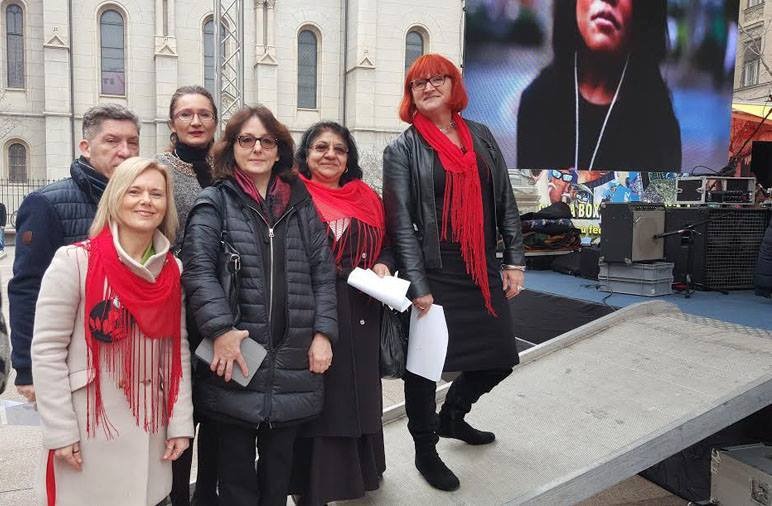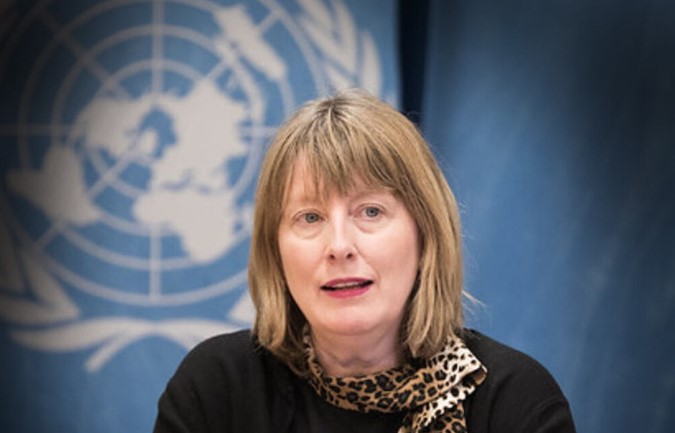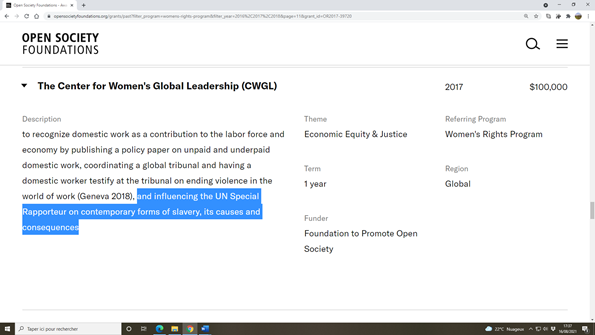HOW UN EXPERTS ARE FUNDED AND INFLUENCED

By: Grégor Puppinck
Photo: ECLJ/Panopticum/UN
After having highlighted the conflicts of interest between certain NGOs and judges of the European Court of Human Rights (ECHR), the ECLJ publishes a new report (91 pages) analyzing the functioning and financing of the UN Special Procedures Human Rights experts. It reveals the insufficiency and opacity of their funding and exposes precisely the methods implemented by some private funders to influence these experts. It also presents recommendations to restore the conditions that would better ensure their independence.
CONFLICT OF INTEREST
In its previous report, the ECLJ demonstrated the existence of conflicts of interest involving ECHR judges. The accuracy of this first report has since been recognized by the ambassadors of the Council of Europe. This time, the ECLJ has devoted several months to meticulously studying the public financing declarations of the UN’s experts. The ECLJ was also able to conduct interviews with 28 of these UN Special Procedures experts, and what emerged was revealing.
The main conclusion of this report is that private foundations directly finance UN experts to write reports that align with these private foundations’ agendas. These reports are then promoted as independent recommendations from the UN, and used by governments and international courts to support or justify their decisions. This is in flagrant contradiction with the code of conduct for experts and the resolutions of the Human Rights Council. Experts should be independent not only from States but also from private foundations that seek to align the experts’ agendas with their own.
Here is one example among others from our report:
On one occasion, though, the Open Society Foundations had openly acknowledged that it wanted to “influence” an expert, stating that it had paid $100,000 in 2017, within its Women’s Right Program, towards the Center for Women’s Global Leadership (CWGL), a feminist activist center attached to Rutgers University (New Jersey), with the purpose of “influencing the UN Special Rapporteur on contemporary forms of slavery, its causes and consequences.” The goal was to get the Special Rapporteur to recognize domestic work as a form of slavery. That goal was achieved, when in the following year, that Special Rapporteur, Urmila Bhoola, devoted her annual thematic report, published under the UN’s label, examining “the impact of slavery and servitude on marginalized migrant women workers in the global domestic economy.” Meanwhile, the CWGL presented to the Rapporteur a “briefing paper on the gender dimension of contemporary forms of slavery, its causes and consequences: challenges, opportunities and strategies to eradicate this phenomena and its particular effect on women and girls” and participated in an expert roundtable held on April 11-12, 2018, under the auspices of the Rapporteur, with the exact same theme…

FIONNUALA NÍ AOLÁIN
The Rapporteur’s July 27, 2018, report specifically addressed the theme desired by the Open Society and CWGL and cited the latter’s theme twice. Her subsequent report, which was later presented at the 73rd session of the UN General Assembly (A/73/139), cited the CWGL seven times.
To promote these reports, a side event (i.e., a public meeting) was organized at the UN headquarters in New York on October 26, 2018, on the issue of “gender dimensions of contemporary forms of slavery and trafficking in persons,” with the participation of the Director of the Center for Women’s Global Leadership and the Rapporteur on Contemporary Forms of Slavery. Finally, on February 8, 2019, the CWGL published an interview with the Special Rapporteur detailing her report.

The Chair of the Board of the Open Society Foundations Women Program between 2011 and 2018 was Fionnuala Ní Aoláin. As such, she gave around 7 million USD/year to radical feminist and pro-abortion groups, as well as to the UN women. In 2017, she became Special Rapporteur on the Promotion and Protection of Human Rights and Fundamental Freedoms while Countering Terrorism.
The Center for Women’s Global Leadership, with the Open Society, also funded the promotion of a report by Juan Pablo Bohoslavsky, an independent expert on foreign debt.
EXAMPLE OF A PRIVATE INSTITUTION
The Center for Women’s Global Leadership (CWGL) describes itself as a center that has “been instrumental in fostering women’s leadership in the area of human rights through leadership institutes, international mobilization campaigns, United Nations monitoring and advocacy” The CWGL is actively engaged in promoting “feminist” causes at the United Nations. It is an example of a private institution that tends to merge its interests with the public institutions that it aims to influence. Melissa Upreti, Chair of the UN Working Group on Ending Discrimination against Women, was recruited as a Senior Director, in charge of Programmes and Global Advocacy. This means that her position at the CWGL is intended to influence her position at the UN Working Group. This is an example of a problematic combination of functions that calls into question the requirement for independent Special Procedures. Previously, Melissa Upreti worked for the Center for Reproductive Rights, the world’s leading pro-abortion legal lobbying body, where she led strategic litigation to liberalise access to abortion in Asia. Ms Upreti is also active in the radical group Open Democracy in the fight against conservative pro-life movements.
DUBRAVKA ŠIMONOVIĆ & CWGL
The relationship between the CWGL and the Special Procedures is close, as in addition to Ms. Upreti, Mr. Yakin Erturk, former Special Rapporteur on Violence against Women, has also been recruited to the CWGL. Similarly, March 8, 2019, the UN Working Group on Ending Discrimination against Women was invited to the CWGL to hold a “consultation” (i.e., a substantive discussion) as part of the drafting of the Working Group’s thematic report to the Human Rights Council in 2020 (A/HRC/44/51). Shortly thereafter, on July 29, 2020, Dubravka Šimonovic, Special Rapporteur on violence against women, its causes and consequences, was also invited to the CWGL to present and discuss her report (A/HRC/44/52). Similarly, Dorothy Estrada-Tanck, a member of the Working Group, was invited to the CWGL on February 18, 2021, to speak about abortion in Honduras. The CWGL is funded by the Ford Foundation, the Oak Foundation, the Open Society Institute Women’s program and the Fund for a Just Society, just to name a few.
THE LATEST REPORT
Unsurprisingly, the latest report of the UN Working Group on Ending Discrimination against Women, presented to the Human Rights Council in July 2021, is steeped in radical activism. The report begins by castigating “centuries of patriarchal, colonial and racialized legal and policy frameworks and institutions.” “Patriarchal oppression, pervasive gender stereotypes, stigma and taboos” are not just a legacy of the past, but a problem exacerbated by “rising fundamentalisms.” The report equates “unplanned pregnancies” with actual violence against women and recommends that states and “non-state actors, such as armed groups,” ensure that women actually “exercise” their “sexual and reproductive rights,” referring chiefly to abortion. The report also calls on states to “take measures to combat toxic masculinity,” without defining or introducing this concept from gender studies. The report goes so far as to equate doctors’ conscientious objection to abortion with an act of “torture” inflicted on women, stating that “the refusal or postponement of an abortion” constitutes a “form of gender-based violence that can be equated with torture or cruel, inhuman or degrading treatment.” From the report, motherhood does not even seem to be an option for women, whose “sexual and reproductive health” would appear to consist only of access to contraception and abortion. Previous reports are of the same ilk.”
Again, we note that the Open Society and its affiliated foundations are among the main funders of Human Rights Council experts, along with the Ford Foundation.
Our investigation also shows that the situation of experts varies greatly. Some are not funded; others resist proposals, and are therefore most pleased with the ECLJ’s investigation. Others still seem to accept private funding without understanding why it would be problematic, and, finally, others gladly accept hundreds of thousands of dollars to promote causes they share with the foundations, even though these ideological battles may fall outside the scope of their mandates.
In its report, the ECLJ is committed to explaining the causes of this flaw in the protection of the independence of experts, why private foundations invest massively in the UN Special Procedures, why the same foundations often act before the ECHR, and what solutions could be promoted to prevent this “capture”” of UN experts.




